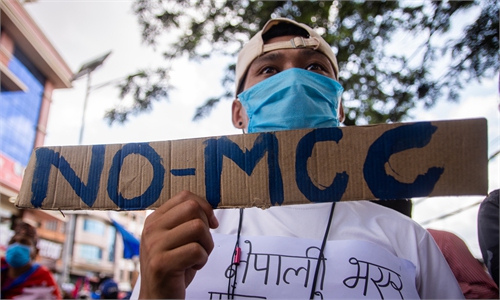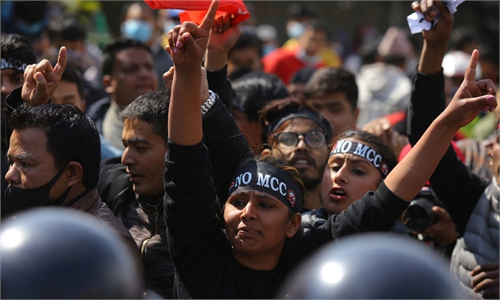US Ambassador nominee's claim that Nepal grants MCC amid 'China's disinformation campaign' baseless and offensive: Chinese embassy

A demonstrator gestures and chants slogans during a protest against the proposed grant agreement from the US under the Millennium Challenge Corporation (MCC), in Kathmandu on February 20, 2022. Photo: VCG
The Chinese embassy in Nepal refutes US Ambassador nominee Dean Thomson's claims about the endorsement of the Millennium Challenge Corporation (MCC) Compact between Nepal and the US amid China's "disinformation campaign," calling the groundless accusation from the US a slander to China and an offence to the Nepalese people.
Thompson, the US nominee for ambassador to Nepal, said on Wednesday that Nepal's parliament ratified the MCC Compact in the face of China's "disinformation campaign."
"The remarks of the US side are totally baseless. They have not only slandered China but also offended Nepal and its people. It is a true 'disinformation' and China firmly rejects it," the Chinese embassy said in a statement on Friday.
It is well known that the MCC Compact between Nepal and the US has sparked a heated debate in Nepal. The Nepali Parliament specially passed an "interpretive declaration," which declares that the Constitution of Nepal shall prevail over the Compact and other associated agreements and that being a party to the Compact, Nepal shall not be a part of any US' strategy, military or security alliance, including the Indo-Pacific Strategy. These are legitimate actions of the Nepali government and people to defend their sovereignty and independence and safeguard national interests, read the statement.
Widespread protests against the MCC took place in Nepal as the seemingly generous aid pact contains provisions that seriously infringe Nepal's sovereignty and national interests.
Nepal's Parliament approved a $500 million grant from the US government on February 27 amid great controversy and huge backlashes from the public. Nepal's coalition government issued an "interpretive declaration" claiming that Nepal will not become part of any strategic, military or security alliance "including the Indo-Pacific Strategy" of the US.
It has not been the first time to see US launched its baseless accusation against China on the MCC project. In February, a US state department spokesperson reportedly said that the US believes China has "actively fomented or encouraged or funded or facilitated" a disinformation campaign in Nepal against the MCC.
It is China's consistent belief that in pursuing international development cooperation, the principle of mutual respect and equality should be upheld, the sovereignty of the country concerned and the will of its people should be fully respected. There should be no interference in any country's domestic affairs, no political strings attached, no coercive diplomacy, and certainly no infringement on other countries' sovereignty and interests for selfish gains, the spokesperson of Chinese embassy remarked.
As Nepal's friendly close neighbor and development partner, China will continue to support Nepal in safeguarding its sovereignty, independence and national interests and support the Nepali people in choosing their own development path independently and offer support and assistance to the country's socioeconomic development to the best of its capability, the Chinese embassy noted.
The China-Nepal long-term friendly cooperative relationship is the very thing that the US does not want to see. After the Biden administration came to power, it has continued the strategy of its predecessor of suppressing and containing China in an all-round way and taken every possible means to crack down on China, including any actions that it believes can disrupt relations between China and neighboring countries, harm China's national interests, and hinder China's development, Lan Jianxue, head of the Department for Asia-Pacific Studies at China Institute of International Studies, commented in an opinion piece in February.


